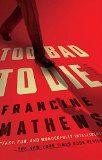Summary | Excerpt | Reviews | Beyond the book | Read-Alikes | Genres & Themes | Author Bio

A Novel
by Alan FurstKnown for writing spy novels based in Europe during the '30s and '40s, Alan Furst has remarked, "In that period of time, there was real villainy and real heroism. The world was embroiled in it, and it didn't let anyone off the hook." In Mission to Paris, he returns to the cities and themes that have often figured in his work, combining movie-making with fictional actor Frederic Stahl's dabble in espionage - an unexpected task that leads the Viennese-born Paramount star to glimpse Kristallnacht, among other disturbing events, and to mingle with characters that range from an accomplished female spy to intellectual émigrés.
Stahl, who has been targeted by Nazi officials for the likelihood of his drawing the media in France, gathers information regarding Germany's impending plans in Europe (Poland especially) that may prove useful to the White House. Specifics remain shadowy; even Stahl is not entirely aware of what these plans entail despite several meetings with the embassy contact who first proposed the work. For most readers, however, behind-the-scenes political maneuverings may be less critical to the plot than the cumulative tension of living under surveillance. Furst brilliantly recreates the ominous environs, describing Paris, Berlin, and other locales just before the appeasement of Hitler via the Munich Agreement in September 1938 through the outbreak of the war. Between the risks of border-crossing, one character's struggle with the Gestapo, murder, and street disturbances,
Mission to Paris is rife with examples of the strain both ordinary and high-profile people endured.
Furst shuttles between two narrative threads - shooting a film plagued by problems and working undercover - in ways that effectively highlight the challenges of moving freely. That both acting and spying require similar talents, from dissembling emotions to persuading others, is not only clever but necessary. Both plot lines meld when Stahl is coerced into serving as a judge for a German film festival, during which time the mindset of the German officials he encounters becomes ever more apparent and disturbing.
Not every plot twist is dark, however. Interludes befitting of Golden Era films weave throughout, replete with witty banter as well as heroic gestures. And one can hardly fault the author for creating a romantic oasis amid an increasingly suspect world. The result is an engrossing examination of one man's willingness to brave the Third Reich's cinema circle and a portrayal of weathering danger for the sake of others.
![]() This review was originally published in The BookBrowse Review in July 2012, and has been updated for the
June 2013 edition.
Click here to go to this issue.
This review was originally published in The BookBrowse Review in July 2012, and has been updated for the
June 2013 edition.
Click here to go to this issue.

If you liked Mission to Paris, try these:

by Francine Mathews
Published 2016
A tense and enthralling historical thriller in which British Naval Intelligence officer Ian Fleming attempts to foil a Nazi plot to assassinate FDR, Churchill, and Stalin.

Lovers at the Chameleon Club, Paris 1932
by Francine Prose
Published 2015
A richly imagined and stunningly inventive literary masterpiece of love, art, and betrayal, exploring the genesis of evil, the unforeseen consequences of love, and the ultimate unreliability of storytelling itself.
Your guide toexceptional books
BookBrowse seeks out and recommends the best in contemporary fiction and nonfiction—books that not only engage and entertain but also deepen our understanding of ourselves and the world around us.